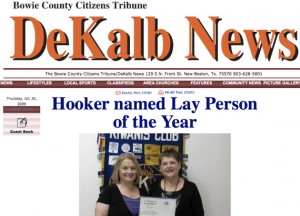One of our favorite year-end delights is the annual publication of Craig Silverman’s Crunk awards. Silverman, whom we interviewed about a year ago, devotes hundreds of hours each year to documenting the missteps of media organizations large and small on his Regret the Error blog. Each year around this time, he publishes the high — and mostly low — lights of the previous 12 months of media messups. It’s a half hour of reading pleasure.
Silverman’s award for the “Correction of the Year” goes to the Washington Post for this brief but symbolic beauty:
A Nov. 26 article in the District edition of Local Living incorrectly said a Public Enemy song declared 9/11 a joke. The song refers to 911, the emergency phone number.
The misstep gets the award because of the torrent of reaction it sparked. The Post‘s error was ridiculed in leading online publications like Techdirt and Huffington Post and even sparked a twitter hash tag (#washingtonpostcorrections) in which thousands of people have posted satirical corrections based on literal interpretations of popular songs.
There’s a serious side to the story, however, and Silverman provides some perspective at the top of his lengthy retrospective.
 News organizations can be forgiven occasional lapses under the burden of deadline pressure, but it’s unfathomable that basic errors of historical fact can occur when the truth is only a Google search away. This reality was brought into sharp relief in July, when The New York Times published a stunning correction of eight errors in a reporter’s retrospective on Walter Cronkite’s career. They included such Wikipediable factoids such as the date of Martin Luther King Jr.’s assassination.
News organizations can be forgiven occasional lapses under the burden of deadline pressure, but it’s unfathomable that basic errors of historical fact can occur when the truth is only a Google search away. This reality was brought into sharp relief in July, when The New York Times published a stunning correction of eight errors in a reporter’s retrospective on Walter Cronkite’s career. They included such Wikipediable factoids such as the date of Martin Luther King Jr.’s assassination.
Such careless disregard for easily verifiable facts doesn’t do news organizations any favors at a time when their credibility is at historic lows. Silverman points out that the media watchdog function has passed into the public domain and sparked several efforts at self-regulation by media companies. Newspaper correction columns have long been a casual afterthought that did little to address the pain and humiliation that the original error may have caused. Publishers could get away with that in the days when they owned the channels of information. Today, bloggers and tweeters can turn an error into a persistent chorus of mockery.
In the case of the Post‘s correction, the lyrics of the Public Enemy song were easily available online, along with interpretations. The abuse that the newspaper earned for the transgression may have been extreme, but hopefully it turned a few heads among the ranks of top editors.
Turning back to the Crunks, there are too many good ones to summarize here, so read through and choose your favorites. You can also show your support for Silverman’s efforts by buying a copy of his book. Our personal favorite comes from the Advertiser in Australia, which published an editor’s dummy copy as this Thought for the Day:
This is the thought of the day and this is where you put the thought of the day as if anyone has a thought for the day. And can’t work out what the hell is going on. But who knows what is happeningishness. – Jesus Mark 7:21-23 (Bible for Today)
We suspect that nearly every veteran journalist can relate to that one.
We’d like to quietly note that this is the 500th post on Newspaper Death Watch since this blog launched in March, 2007. Thanks to the nearly 1,000 people who visit this site on a typical weekday. Your many comments and messages of encouragement do far more to keep us motivated than the sporadic beer money from Google AdSense.
Comments
This entry was posted on Friday, December 18th, 2009 at 10:30 am and is filed under Google, Hyper-local. You can follow any responses to this entry through the RSS 2.0 feed. Both comments and pings are currently closed.


